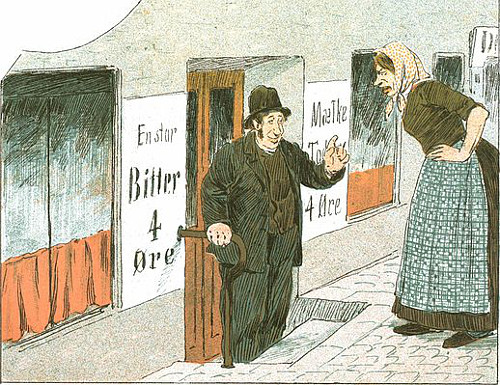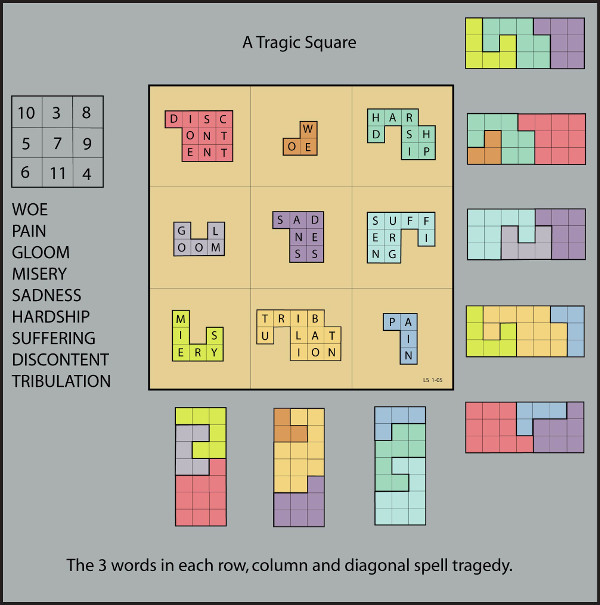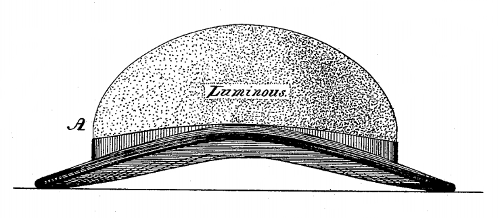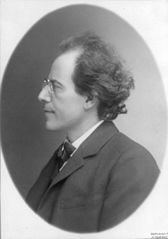
A puzzle from Oswald Jacoby’s Mathematics for Pleasure (1962):
The MacDonalds are planning a long car journey of 27,000 miles. If they use tires that last 12,000 miles each, how many tires will they need, and how can they make the best use of them?

A puzzle from Oswald Jacoby’s Mathematics for Pleasure (1962):
The MacDonalds are planning a long car journey of 27,000 miles. If they use tires that last 12,000 miles each, how many tires will they need, and how can they make the best use of them?
John Cage indicated that his 1987 piece Organ2/ASLSP should be played “as slow as possible,” but he declined to say how slow that is. Because a pipe organ can be rebuilt piecemeal as it plays, in principle there’s no limit to how long a performance can last.
In 1997 a conference of musicians and philosophers decided to take Cage’s instruction seriously and arranged a performance that would last 639 years. Fed by a bellows, a custom-built organ in the St. Burchardi church in Halberstadt, Germany, has been playing the piece since Sept. 5, 2001; it began with a contemplative 17-month pause, then played the first chord (A4-C5-F#5) for two years. Since then it’s got through only 12 changes; the next won’t occur until Sept. 5, 2020.
This will go on for another 620 years, ending on September 5, 2640. By that time someone somewhere will probably be playing it even more slowly.

diffidation
n. a severing of peaceful relations
clarigation
n. a recital of wrongs before declaring war

The magic square at upper left arranges the numbers 3-11 so that each row, column, and long diagonal totals 21.
Lee Sallows found nine tragic words that vary in length from 3 to 11 letters and arranged them into the same square — and he found a unique shape for each word so that every triplet can be assembled into the same 3×7 shape, shown in the border.

“It has been said, not truly, but with a possible approximation to truth, that in 1802 every hereditary monarch was insane.” — Walter Bagehot

Robert Heath thought we should all wear luminous hats. Confronted with the resounding question Why?, he offered this poetic paragraph:
Among the advantages of the invention are, the facility of seeing and finding the hat, &c., in closets and dark rooms and places, the presentation of a hat, &c., of different shades during day and night, the beautiful appearance of the article when worn at night, and the provision of distinguishing or indicating the localities of those who may wear the hats, &c., whose occupations are dangerous, such as miners, mariners, &c. For persons who are exposed to weather, sea, &c., the head-wear will be suitably waterproofed, so that the self-luminous nature thereof will not be injured by water.
Simple enough. His patent was granted on Feb. 27, 1883.
A quickie submitted by John Astolfi to MIT Technology Review’s Puzzle Corner, July/August 2013:
Consider the expansion of π (3.14159 …) in base 2. Does it contain more 0s than 1s, more 1s than 0s, or an equal number of both? Or is it impossible to tell?

One characteristic incident of his fearlessness occurred when friends of Mahler recommended the Berlin Royal Opera to engage him just before he had signed to go to Hamburg. The intendant at the German capital, who was said to be anti-Semitic, is reported to have replied, ‘We cannot engage Mahler here, as we do not like the shape of his nose.’ When in 1897 Vienna offered Mahler the directorial and managerial control of its opera, Berlin suddenly awoke to the importance of the artist who was leaving Germany, and made him a proposition financially better than the one from Vienna. Mahler at once signed the contract to go to the banks of the Danube and telegraphed Berlin: ‘Regret that I cannot accept. My nose still the same shape.’
— Musical Courier, quoted in Current Literature, July 1911
See Late Acceptance.

Here’s a subtly impossible figure devised by UC-Santa Cruz computer scientist David Huffman. If it’s a three-sided pyramid, then its edges define the intersections of three planes and should meet in a single point. But they don’t:

This is intriguing because the figure doesn’t immediately look impossible. In Vagueness and Contradiction, philosopher Roy Sorensen writes, “The impossibility of an appearance is sometimes concealed without overloading our critical capacities.”
Possibly this is because we sense that other solutions are possible that can reconcile the error. Zenon Kulpa points out that the pyramid becomes intelligible if we imagine that the farther side hides a fourth edge, giving the figure four sides rather than three. He describes two families of such solutions in “Are Impossible Figures Possible?”, Signal Processing, May 1983.

In March 2013, New Mexico art dealer Forrest Fenn announced that he had hidden a bronze treasure chest in the Rocky Mountains north of Santa Fe. In the chest, he says, are gold coins, artifacts, and jewelry worth more than $1 million.
Fenn said he’d conceived the idea when diagnosed with cancer in 1988, planning to bury the treasure as a legacy. The cancer went into remission, but he decided to bury the chest anyway. In a self-published memoir he offered the following poem, which he says contains nine clues:
As I have gone alone in there
And with my treasures bold,
I can keep my secret where,
And hint of riches new and old.
Begin it where warm waters halt
And take it in the canyon down,
Not far, but too far to walk.
Put in below the home of Brown.
From there it’s no place for the meek,
The end is ever drawing nigh;
There’ll be no paddle up your creek,
Just heavy loads and water high.
If you’ve been wise and found the blaze,
Look quickly down, your quest to cease,
But tarry scant with marvel gaze,
Just take the chest and go in peace.
So why is it that I must go
And leave my trove for all to seek?
The answers I already know,
I’ve done it tired and now I’m weak.
So hear me all and listen good,
Your effort will be worth the cold.
If you are brave and in the wood
I give you title to the gold.
Fenn has been releasing further clues periodically as he follows the search (“No need to dig up the old outhouses, the treasure is not associated with any structure”). A number of people claim to have found the chest, but none has provided evidence, and Fenn says that to the best of his knowledge it remains undiscovered.
If you find it, I figure you owe me 75%.
06/07/2020 UPDATE: It’s been found.